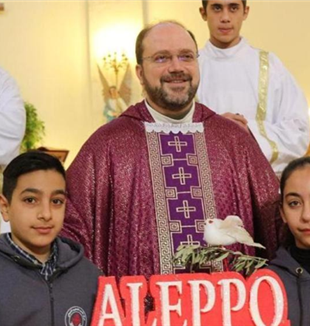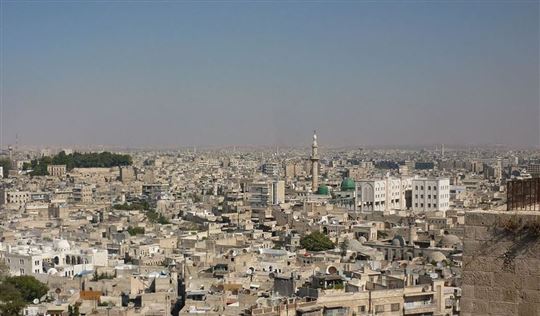
ALEPPO: CLASHES OFFSET BY LIGHTS AND A PLATE OF SWEET GRAIN
Interview with Fr. Ibrahim published in La Stampa. "It is Christ who gives us the strength and the generosity of heart to listen and help this wounded humanity."The mounds of rubble, the smoke from the explosions, the frightened and helpless look in children’s eyes, the painful perseverance of mothers and fathers, the lost expression in the faces of the elderly: these are the images of Aleppo fed to us each day by the media, along with images of meetings between the “greats” of the land, intent on finding solutions to the Syrian conflict. Aleppo is at the end of its rope. Yet, in this city that seems overcome by devastation and the ceaseless humiliation of human beings, bonds of care, hospitality and dedication are being formed. These forms and gestures of protection and care – invisible to the media but existentially crucial – keep people going even in the most extreme conditions: there is something immense growing there, the warmth of God’s presence can be felt.
As Christmas approaches, we put some questions to the Franciscan friar Ibrahim Alsabagh, a 46-year-old Syrian who is parish priest of St. Francis Church situated in the western part of the city, which is controlled by the regular army. Fr. Ibrahim (who wrote “An Instant Before Dawn”, recently published by Edizioni Terra Santa, a collection of newsletters and other texts written by the friar over the last two years) is also a guardian of the convent, episcopal vicar and head of the Latin community.
What is the situation like in Aleppo at the moment?
“We are in a transition phase, caught between the enormous difficulties resulting from clashes between the regular army and militants and the future which is unknown, the challenges that lie ahead in terms of the liberation of the city which will need to be rebuilt completely.”
How many people are there currently in the western neighbourhoods? Have many decided to leave the city in recent weeks?
“There are said to be more than 1,200,000 still living in the western zone, according to the information we have, which mostly regarding Christian families; the exodus is still continuing now that the city’s liberation seems close. Many people who are worn out as a result of suffering, deprivation and bombing, flee in the belief that Aleppo is now nothing more than a city of death that will take decades to rebuild and that the costs involved in this will be sky high”.
What news do you have from the eastern neighbourhoods?
“I know that thankfully thousands of people have managed to leave that part of the city, which has been torn apart by bombs and violent clashes. They have been taken to camps where they are taken in and looked after. The information we have is incomplete.”
Have living conditions in western neighbourhoods improved?
“No, they are still disastrous. There are still water and electricity cuts, which sometimes last hours or days; the price of food is through the roof: people struggle to buy even basic goods such as milk, rice and vegetables. Medicines have also become unaffordable and some are impossible to find. Many homes have been destroyed or seriously damaged and there is no money to repair them or to pay the rent in houses that have remained intact. There is joblessness and trading is almost non-existent. People are paralysed by poverty, fear and the relentless bombing.”
What help do you friars receive?
“Gratuitous and disinterested commitment is contagious. At first, my confreres and I were on our own, almost single-handed, but for some time now we have been able to count on a large group of volunteers, men and women of all ages, who help us in our daily efforts to offer assistance; to see people serve others with such generosity, it is moving. Then there are also many in West who are concerned about these devastated people and send us some money which helps us take care of people’s many needs. Sadly not everyone; the ones we seldom see are the big international organisations like the Red Cross or Médecins Sans Frontières.”
How are your days spent?
“They are improvised: together with the volunteers we face emergencies that crop up, offering our help to anyone that needs it. Like I said, a Christian does not only look after “his own”. We help in many different ways: we distribute food kits, water, clothing and medicine, we assist the sick, we look after children, the elderly and the disabled, we repair houses damaged by the bombs, we help families pay the rent. We also devote a great deal of our time to listening to people in need of consolation, support and someone to lean on so they do not feel lonely. It is a huge task. In the midst of constant change, we friars remain anchored in Eucharistic celebrations, prayer and the administration of the sacraments. It is Christ who gives us the strength and the generosity of heart to listen and help this wounded humanity. It is His closeness, His peace and His consolation we wish to bring.”
How are you spending Advent?
“Christmas is the feast of joy, celebrating the birth of the King of peace who came to offer His peace to the people. Christmas is the time of great hope, the time of light, the move from slavery and imprisonment to the freedom of God’s children. During these weeks we try to transmit hope, to bring everyone the message of the Son of God’s birth: God became man in order to give every man peace, joy and freedom from evil, which humans cannot obtain by themselves. We seek to be faithful to the words of John the Baptist who invites us to “straighten crooked roads and smooth rough ways” so that the Lord can enter people’s hearts. In this time of Advent—alongside priests and bishops of other Christian traditions too—we devote a great deal of time to the Sacrament of Reconciliation, believing in the immense value of forgiveness. When the waves of hatred and violence spread, they can end up infecting people’s hearts, turning them to stone and thus compromising even family bonds. Let us encourage each person to treat others, especially their loved ones with mercy. Peace is built upon that peace which keeps families close-knit and united. We also seek to offer small but essential signs of hope.”
What signs exactly?
“Together with the volunteers, for example, we are getting young people involved in building the big Nativity Scene we will be placing near the altar. We are planning a celebration for children where we will be offering them sweets, biscuits and clothes. We want to reach out to a large number of young people, not just to those who attend church on a regular basis, so we are going to schools to hand out small gifts; we want them to really feel that we are going beyond the boundaries of distribution and death and moving towards the light and life. Of course there are many ways in which we look after adults too.”
In the run-up to Christmas do you see hope or pain, discouragement and resignation to the suffering and evil prevail?
“In everyone’s simple day-to-day life, people pick up on the signs immediately: when a sick person receives a visit and words of affection accompanied by a tender blessing, they notice the sign straight away, they realise there is hope. When a very poor family receives money to cover the costs of a pregnancy, this and the new baby are hope being born into the world. When a young man who has nothing to cover up with during the winter receives a thick jacket as a gift, he immediately notices the sign: hope is reborn. The same thing happens when a child—who is unable to swallow due to fear—is able to go to a party (like the one we have organised for the feast of St. Barbara) and they eat a plate of sweetened grain with their friends. We seek to be prophets of hope. In the past few days we decorated the church and and turned on all of the tiny lights: in the darkness of the night and of people’s hearts these are a sign of hope and of the Light we are waiting for what we are certain will come.”
How will you spend Christmas day?
“We don’t have a set plan yet. There definitely isn’t going to be a vigil mass on Christmas eve, it’s too dangerous. We will celebrate mass around sundown, as we do on all other days of the year. We’re thinking of organising a celebration when Christians can exchange wishes and something special for the children. Meanwhile, we are preparing our hearts for the coming of the Lord. We are lighting the tiny lights.”
Published on 13 December, 2016, in La Stampa